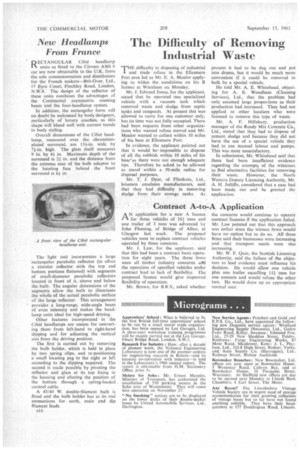The Difficulty of Removing Industrial Waste
Page 50

If you've noticed an error in this article please click here to report it so we can fix it.
THE difficulty in disposing of industrial and trade refuse in the Ellesmere Port area led to Mr. E. A. Mealor applying to widen the conditions on his B licence at Wrexham on Monday.
Mr. J. Edward Jones, for the applicant, stated that he operated one" specialized vehicle with a vacuum tank which removed waste and sludge from septic tanks and cesspools. At present this was allowed to carry for one customer only, but its time was not fully occupied. There had been requests from other organizations who wanted refuse moved and Mr. Mealor wanted to collect within 10 miles of his base at Ellesmere Port.
In evidence, the applicant pointed out that it would beimpossible to dispose of all the rubbish within 10 miles of his base' as there were not enough adequate tips. Therefore he asked to be allowed to travel within a 50-mile radius for disposal purposes.
Mr. T. J. Dyer, of Flintkote, Ltd., bitumen emulsion manufacturers, said that they had difficulty in removing sludge from their storage tanks. At
present it had to be dug out and put into drums, but it would be much more convenient if it could be removed in bulk by a special vehicle.
He told Mr. A. E. Whitehead, objecting for A. E. Woodham (Cleaning Services), Ltd.. that the problem had only assumed large proportions as their production had increased. They had not applied to other hauliers who were licensed to remove this type of waste.
Mr. A. F. HilIsbury, production manager of the Ready Mix Concrete Co., Ltd., stated that they had to dispose of cement sludge and because they did not have the use of a special vehicle they had to use manual labour and pumps. This was most unsatisfactory.
In submission, Mr. Whitehead said that there had been insufficient evidence regarding the attempts of the witnesses to find alternative facilities for removing their waste. However, the North Western Deputy Licensing Authority, Mr. A. If. rolliffe, considered that a case had been made out and he granted the application.




































































































































